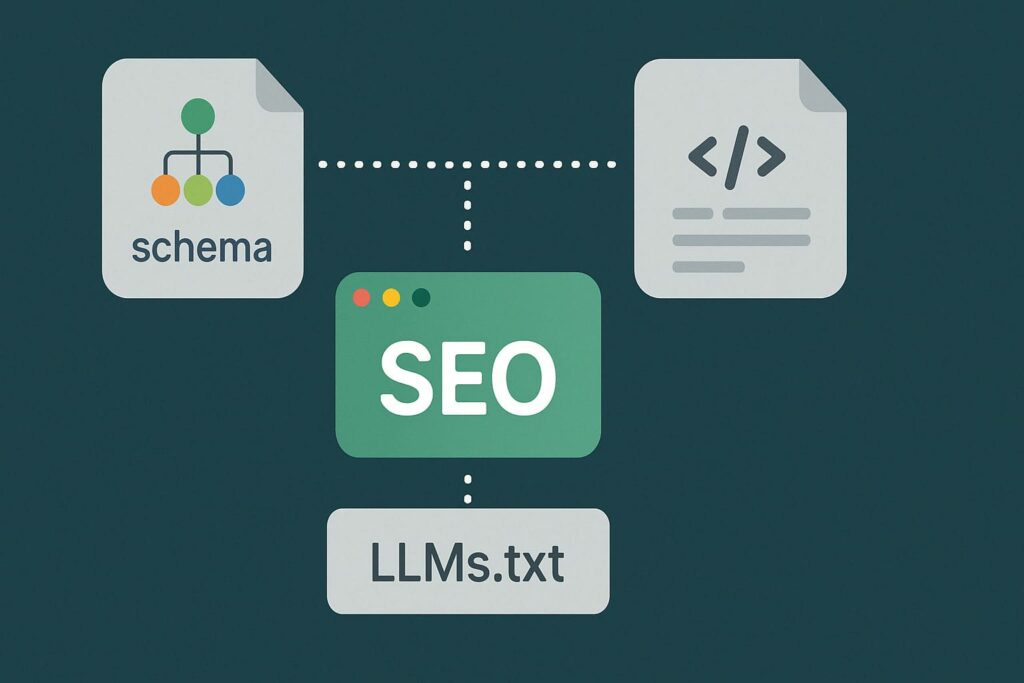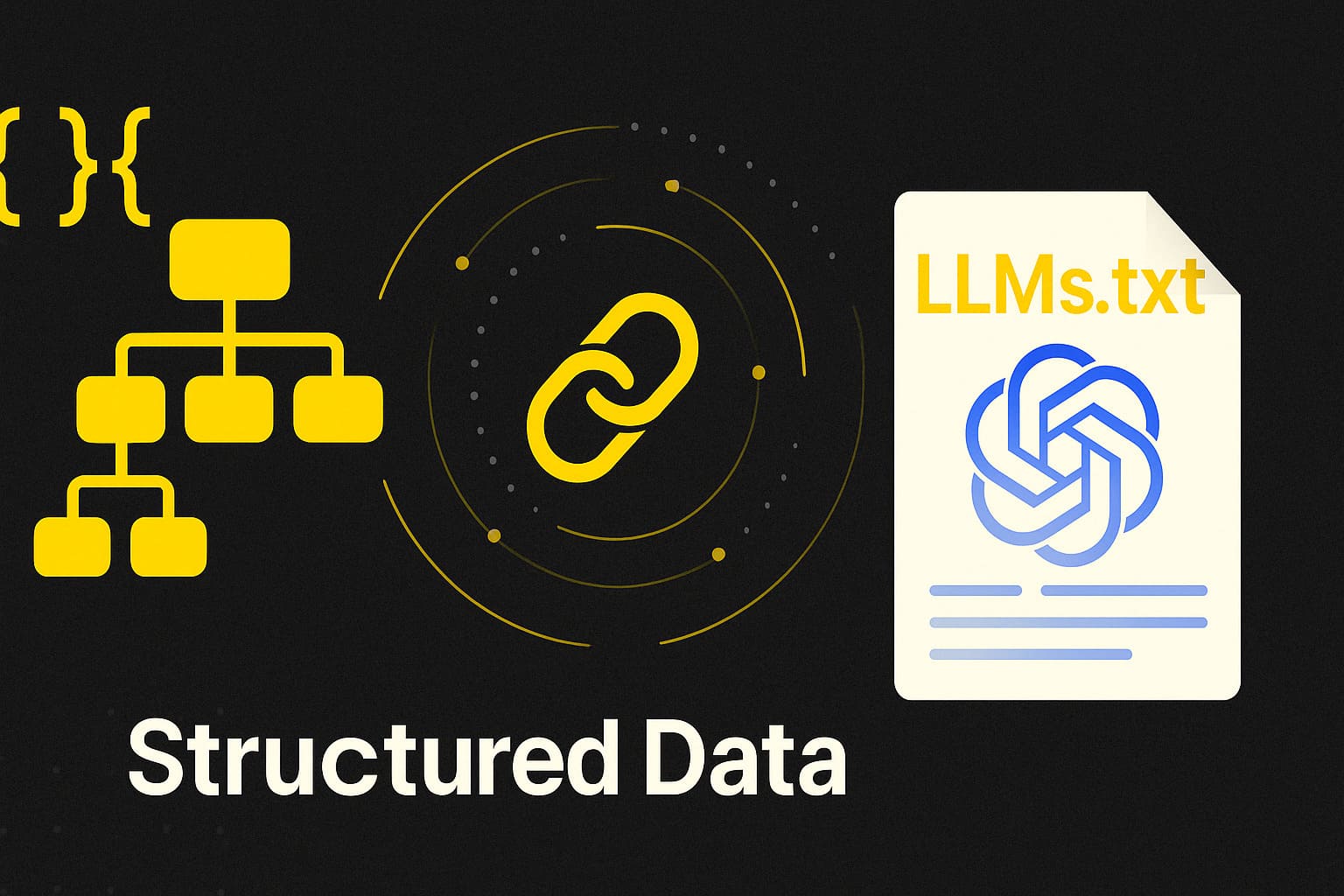The Role of Structured Data and LLMs.txt in Generative SEO
- Posted 1 week ago
As the digital landscape evolves, so does the need for businesses to ensure their websites are optimized not only for traditional search engines but also for AI-driven systems. One of the ways businesses can improve their online visibility is by utilizing structured data and ensuring that their websites are properly configured for LLMs.txt. These two tools play a significant role in generative SEO, helping businesses provide rich content that is better understood and processed by AI systems.
In this blog post, we will explore how Schema.org and LLMs.txt together enhance the visibility of websites in AI-generated answers. We’ll also delve into how JSON-LD examples help sync with LLMs.txt to create a seamless and efficient AI experience.
What is Structured Data and How Does It Impact SEO?

Structured data refers to the organization and formatting of information on a website in a way that allows search engines and AI systems to better understand the content. It is commonly implemented through markup, typically JSON-LD, Microdata, or RDFa, and helps search engines identify critical pieces of information on a webpage.
One of the most popular forms of structured data is Schema.org. This initiative offers a collection of schemas or standards for adding structured data to web pages. It helps search engines interpret the meaning of content better and display more relevant information in rich snippets.
For example, using Schema.org markup, a website selling products can provide data about price, availability, and ratings. This information helps search engines display product details directly in search results, increasing visibility and engagement.
The Role of LLMs.txt in AI Search Engines
As artificial intelligence continues to evolve, especially with the rise of large language models (LLMs) like ChatGPT, Claude, and Perplexity, it’s important to consider how these systems crawl and process website data. LLMs, which power generative search engines, rely on web data to generate detailed and contextual answers for users.
LLMs.txt is a relatively new but crucial tool in managing how LLMs crawl, interpret, and use website data. While robots.txt helps direct traditional search engine crawlers, LLMs.txt serves a similar purpose but focuses on guiding AI crawlers.
How Does LLMs.txt Help?
LLMs.txt allows website owners to define how AI models should interact with their data. By using LLMs.txt, you can:
- Control the use of your data in training AI models.
- Specify which sections of your website should be used for generating AI responses.
- Exclude certain sensitive content from being used by AI systems.
For instance, if you have a product description that you want to keep exclusive, you can use LLMs.txt to prevent it from being included in AI-generated answers.
How Schema.org and LLMs.txt Enhance AI Search Results
Both Schema.org and LLMs.txt play complementary roles in enhancing visibility in AI-generated answers. When combined, these tools ensure that AI systems, like ChatGPT or Perplexity, can understand and access your content in the most effective way.
Enhanced Data Understanding with Schema.org
Schema.org provides a clear and structured format that AI models can read more easily. By marking up content with JSON-LD or Microdata schemas, you are giving LLMs the structured data they need to process information accurately. This allows LLMs to extract relevant facts from your website and integrate them into responses that they generate.
For example, a recipe website that uses Schema.org can ensure that AI systems understand the ingredients, cooking time, and steps involved in the recipe. When users ask an AI about cooking a specific dish, the AI can respond with accurate details sourced from the schema markup, making the answer more useful and informative.
LLMs.txt: Directing AI to the Right Content
Once you’ve structured your data with Schema.org, the next step is to ensure that LLMs correctly access and use this information. This is where LLMs.txt comes into play. By guiding AI crawlers, you can direct them to the specific pages or content that you want them to focus on.
In this case, LLMs.txt helps ensure that AI systems extract the most relevant data, reducing the chances of irrelevant or outdated information being used. It also allows you to prevent sensitive or proprietary data from being used in AI-generated answers.
How to Use JSON-LD with Schema.org and LLMs.txt
JSON-LD (JavaScript Object Notation for Linked Data) is the preferred method for adding structured data to your website. It allows you to embed data in a script tag within the HTML, making it easy for search engines and AI systems to read and interpret.
Here’s an example of how you can use JSON-LD to mark up a product page with Schema.org to enhance AI search visibility.
Example: JSON-LD for a Product Page
jsonCopy{This JSON-LD script provides search engines and AI systems with critical information about the product, such as its name, description, price, and availability. The schema markup ensures that AI systems can easily access this information and use it to generate accurate and helpful answers when queried.
"@context": "http://schema.org",
"@type": "Product",
"name": "Wireless Headphones",
"image": "https://example.com/headphones.jpg",
"description": "High-quality wireless headphones with noise cancellation and 20-hour battery life.",
"brand": {
"@type": "Brand",
"name": "TechGear"
},
"sku": "12345",
"offers": {
"@type": "Offer",
"url": "https://example.com/wireless-headphones",
"priceCurrency": "USD",
"price": "99.99",
"priceValidUntil": "2022-12-31",
"itemCondition": "https://schema.org/NewCondition",
"availability": "https://schema.org/InStock"
}
}
Syncing JSON-LD with LLMs.txt
Once you’ve structured your data with Schema.org using JSON-LD, the next step is to sync this data with LLMs.txt. By ensuring that LLMs.txt allows AI systems to crawl the relevant pages containing the structured data, you can ensure that your data is used effectively.
Here’s how you can guide LLMs with LLMs.txt:
txtCopy# LLMs.txt file
# Allow access to product pages
Allow: /product/
# Block access to sensitive data
Disallow: /private/
In this example, the LLMs.txt file directs AI crawlers to the product pages while blocking access to sensitive data. This ensures that only relevant data is used in AI-generated responses.
Read Also : LLMs.txt Explained: A Must-Have for SEOs in the Age of Generative AI
Conclusion
By using Schema.org, JSON-LD, and LLMs.txt, you can significantly improve your website’s visibility in AI-generated answers. Schema.org helps AI systems understand your content, while LLMs.txt ensures that AI crawlers focus on the right data. Together, they enhance the accuracy and relevance of the responses generated by AI search engines like ChatGPT and Claude.
Incorporating structured data and optimizing your website for AI systems will help your business stand out in an increasingly AI-driven world. It also ensures that your website content is accessible, useful, and accurately represented in the ever-evolving landscape of generative SEO.

